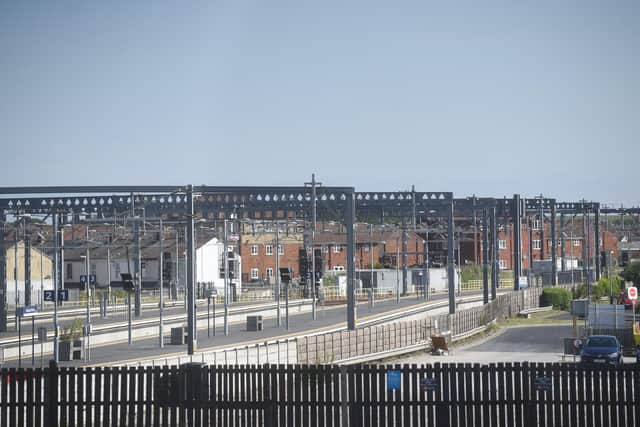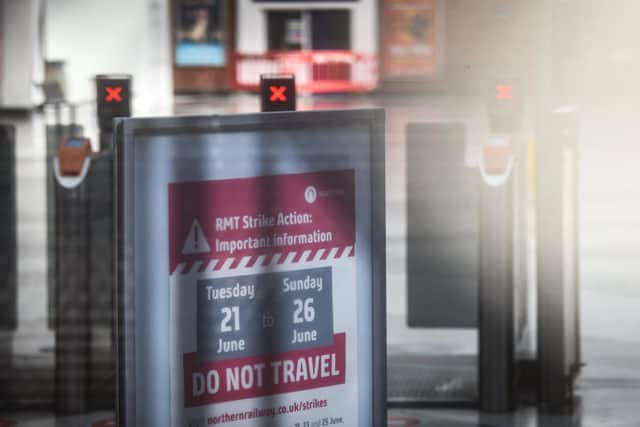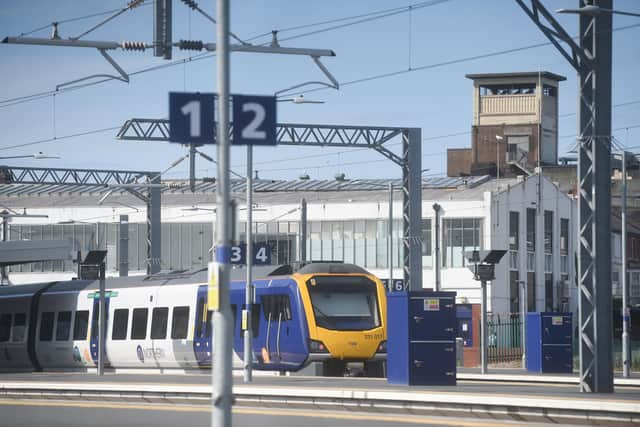This is when Lancashire train users will be hit by new round of cancellations due to strikes
and live on Freeview channel 276
The biggest rail workers’ union has announced two further strikes this summer in the worsening dispute over jobs, pay and conditions, while members of other transport unions have voted for action with dates yet to be confirmed.
Lancashire passengers faced cancelled trains, reduced services and delays during the last strike, from June 21-23, but are set to face more, as a series of disputes over pay and conditions show no signs of being resolved.
Advertisement
Hide AdAdvertisement
Hide AdMembers of the Rail, Maritime and Transport union (RMT) at Network Rail and 14 train operators have confirmed new strikes dates while drivers in the Aslef union and both on-train and station staff from the TSSA union have voted for action.


When are the strikes due?
The RMT union had previously announced a strike for July 27, but now staff will also walk out on August 18 and 20.
The drivers’ union Aslef earlier announced its members at eight train companies will strike on July 30 in the same dispute.
The companies involved in the RMT strikes are: Network Rail, Northern Trains, Transpennine Express, Avanti West Coast, plus others in the South.


How will it affect trains in Lancashire?
Advertisement
Hide AdAdvertisement
Hide AdThe Rail Delivery Group said, that while it is too early for full details on which services will be running, it is likely that a similar reduced timetable will be put in place to June’s.
In June, it advised passengers not to travel unless necessary and to plan ahead. Train services start later and finished much earlier than usual (7.30am to 6.30pm) and only around 20 per cent of services were running.
The number of passenger services was limited to around 4,500 compared with 20,000 normally.


Services to some stations such as Blackpool and Chester were cancelled altogether, while the number running through Preston was drastically reduced despite the West Coast Main Line remaining open.
Last services from London to Scotland left in the early afternoon.
What has the union said?
RMT general secretary Mick Lynch said: “The rail industry and the Government need to understand that this dispute will not simply vanish.
“They need to get serious about providing an offer on pay which helps deal with the cost-of-living crisis, job security for our members and provides good conditions at work.
Advertisement
Hide AdAdvertisement
Hide Ad“Recent proposals from Network Rail fell well short on pay and on safety around maintenance work.
“And the train operating companies have not even made us a pay offer in recent negotiations.
“We remain open for talks, but we will continue our campaign until we reach a negotiated settlement.”
Who else is in dispute?
The TSSA union’s members in station grades at Avanti West Coast voted for strike action and action short of a strike at the end of last month, although no dates have yet been set.
TSSA members at TransPennine Express this week voted for industrial action short of a strike in a dispute over pay, conditions and job security.
The union is demanding a guarantee of no compulsory redundancies for 2022, no unagreed changes to terms and conditions, and a pay increase which reflects the escalating cost of living.
TSSA General Secretary Manuel Cortes said: “The results demonstrate that our members are utterly determined to fight for their pay, jobs and conditions via strike action or action short of a strike - which means they can’t cover for other trade union's members taking strike action.
“They are right to do so amid the escalating Tory cost of living crisis and with a chaotic government hell bent on making swingeing cuts to our rail network while inflation rages."
What do the rail bosses say?
Advertisement
Hide AdAdvertisement
Hide AdA spokesman for the Rail Delivery Group said: “This is a hugely disappointing announcement from the RMT’s leadership which will upset passengers’ summer plans, undermine struggling businesses and upend the industry’s recovery.
“We want to give our people an increase in pay, but asking taxpayers to shoulder more of the burden when they have already contributed £600 per household during the pandemic, or expecting passengers to fund it by paying more for their tickets, isn’t fair or sustainable.
“Instead, we have a responsibility to make changes to long-outdated working practices so we can adapt to post-Covid travel patterns, bring our railway up to date and give our passengers a more punctual and reliable service.
“Rather than staging counterproductive strikes, we ask the RMT’s leadership to continue talking so we can come to a deal that works for our people, our passengers and for taxpayers.”
Andrew Haines, chief executive of Network Rail, said: “By announcing even more strike dates, the RMT has dropped any pretence that this is about reaching a deal.
“It’s clear the best interests of passengers and our staff are taking second place to the union’s bosses’ political campaign.”
Why is the Government taking such a hard line?
A Department for Transport spokesperson said: ”The rail industry has to modernise and be brought into the 21st century for the benefit of passengers and staff alike. There’s no getting around that and we’re extremely disappointed to see more strikes announced.”